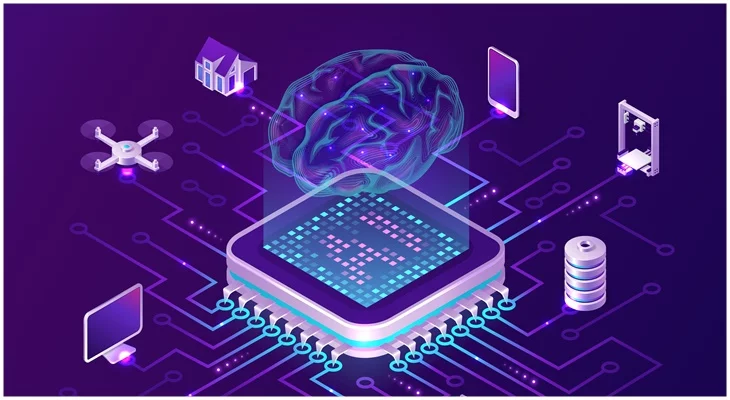Effect Of Artificial Intelligence As A Service: Service Industry in Focus
In this blog, we will be looking at the effect of artificial intelligence as a service on the service sector. AI as a service is a new AI adoption paradigm that has its origins in the recent Software as a Service or SaaS craze. Continue reading to learn more.
What is AI as a Service?
Artificial intelligence as a service (AIaaS) is an AI platform that helps businesses to implement and grow AI approaches for a fraction of the expense of a full-fledged AI department. AIaaS providers provide the whole package of AI services as a unified platform. It covers problem creation, keeping the model on track, and expanding to new use cases. AIaaS also covers constructing the model and deploying it in production. It helps to maintain the model in real-world conditions.
Industries across verticals began to transition toward the web as the dominant application delivery mechanism. The SaaS model gained acceptance. Initially for external customer-facing use but increasingly for internal company delivery. During this time, there was a growing demand for rapid software delivery. This was for both initial deployments and for feature additions. We can now upload these to a server with immediate impact.
Artificial Intelligence’s Importance
The significance of artificial intelligence and its later components has long been recognized. The AI tools and methods help make the world a better place. It’s also unnecessary to go to these high-tech gadgets to use them. Simply look about, and artificial intelligence is assisting you with the majority of your tasks.
Its relevance stems from the fact that it makes our life easier. Humans benefit greatly from these technologies. These tech function to reduce human work to the greatest extent possible. They aim to work in an automated manner. As a result, manual intervention is the last thing needed while using parts linked with this technology.
These machines are capable of speeding up your operations and processes. They can do so while maintaining a high level of precision and accuracy. This makes them a useful and significant instrument. These technologies and apps are not only relevant to our general and everyday lives. They also make the world a more error-free place through their easy and everyday ways. It has an impact on and is important in other areas as well. There has been mostly a positive effect of artificial intelligence as a service on the service sector.
Benefits Of AI As A Service
Create, Build, Run, And Manage AI-Based Solutions
Every AI application is distinct. Every manufacturer, even within the same vertical or operational region, uses customized data. This helps them to achieve specific goals based on a specific business rationale. All these parameters must translate and apply to the model for the AI solution. This is important to give a perfect fit for the data, usability, and business goals.
The tailored solution is a way to extract value from AI, not an end in itself. Mainstream solutions do not meet the specific objectives, and limits of the business and so are ineffective. Thus, achieving the ROI needs a customized solution.
Achieve And Maintain Robustness & Stability
In production, the AI solution must deal with extreme data scenarios. These scenarios are noisy, unstructured, or tiny data sets 24 hours a day, seven days a week. Achieving this level of resilience and stability is the fundamental test of effective AI. Thus, integrated technologies and AI expertise are essential.
Ensure Long-Term Value
While establishing output can be challenging, it is only the first half of the battle. The second half of the struggle is to keep the model running. This is to ensure that it doesn’t fall off the rails as data and conditions change.
The following are all necessary for maintaining AI in production;
- Data and model version management
- Updates
- Optimization of human-machine interaction
- Monitoring of the model’s resilience and generalization
- On-going input noise detection and correlation
- Maintaining AI solutions can be a difficult and costly task.
- Enable an AI transformation Throughout
Companies that use AI progressively experience more value far faster. It is a must to avoid the emergence of a patchwork of isolated use-case-based AI solutions that can’t perform fully. Thus, it is critical to maintaining consistency in the AI deployment approach.
Effect Of Artificial Intelligence As A Service On The Service Industry
Communication Made Easy
Due to the impact of AI on the market, conversing with clients is now a lot easier than ever before. Lesser experienced support personnel now speak with users about more complex, complicated topics. Also, they can escalate the issue using advanced AI advice. This is a significant improvement over previous practices. Also, many businesses have begun to adopt it.
Identifying Customer Issues Early On
It’s even possible to predict what kinds of problems a user might have before they occur. Also, you can address them ahead of time. This may appear to be magical to an outside spectator unfamiliar with the underlying technology. But, it is quite real, and it will only improve.
Users get a warning about difficulties with their accounts before they even notice something is amiss. They get a notification accompanied by a note. It alerts the user about the rectification of the issue. This improves the user’s perception of the firm dramatically. Now, they are more willing to continue working with them.
Directing Support Specialists
The job of the regular customer service representative has also become much easier. Operators can discover issues and solutions. They can do so without having to know too much about the systems they work with. They can also be directed by smart AI assistants who can point out exactly what steps they need to take. Investing in robust customer service and ticketing platforms is more crucial than ever.
The average service professional within an organization will be far more capable of working with that system than previous ones. It won’t take long to get them up to speed. Also, you’ll be able to share any expertise they gain with others within the company.
Keep Things Going
When it comes to customer service, keeping momentum is crucial. This often necessitates a large amount of data and services that can react to signals quickly. AI is the best thing you can integrate into your services if you want to keep things running well without putting in too much effort.
If you execute everything well, maintaining that momentum will become difficult as time passes. This happens due to accumulating a large amount of data that will aid you in future operations.
Assurance Of Results
Another key factor in the customer service industry is the accuracy of the services you’re giving. It’s crucial to pay attention to the accuracy of the services you’re offering. Also, you need to keep making modifications to your present course of action if things don’t go as planned. AI helps to narrow down the results with greater precision. AI unlocks the potential of your services for your users. You can analyze the results of earlier service interactions to see how they could improve. This allows you to improve things even more in the future.
Patterns To Look For
Many trends in the data you’re collecting aren’t immediately visible. But, they’re still vital to be able to spot and use in your operations. Earlier, this was a very difficult task. This is no longer the case. We are adept at recognizing and working with patterns. AI can bring to the surface things you didn’t even know were there.
Also, it can give you a lot more to work within every customer care interaction. The best part is that the more you work, the more data you’ll collect. This will allow you to develop your services even further in the future.
Streamlined Hiring And Onboarding
The subject of hiring and onboarding should not be overlooked. This is a long-standing issue in the customer service industry. Also, there is no unifying answer because each organization’s problems are unique. You can select viable candidates and focus your attention on them with the help of AI. You can also use a more simplified approach to guiding new staff through their work. Thus ensuring that everyone is up to speed as soon as possible.
Conclusion
Machine learning AIs progress throughout time with use, development, and improvement. The effect of artificial intelligence as a service on the service business has risen tremendously in recent years. This is thanks in large part to the boom brought on by AI’s growth and tight integration with our existing services.
Many factors exist to believe that things will continue to move in the same direction. AIaaS is a rapidly expanding industry, and it will continue to find new niches to serve for years to come.
You may also like to read:
What Is AI As A Service: Some Advantages, Challenges And Use Cases
Combining Blockchain with Machine Learning: Benefits and Challenges
AI And Neural Network In Customer-Service: Benefits And Challenges





